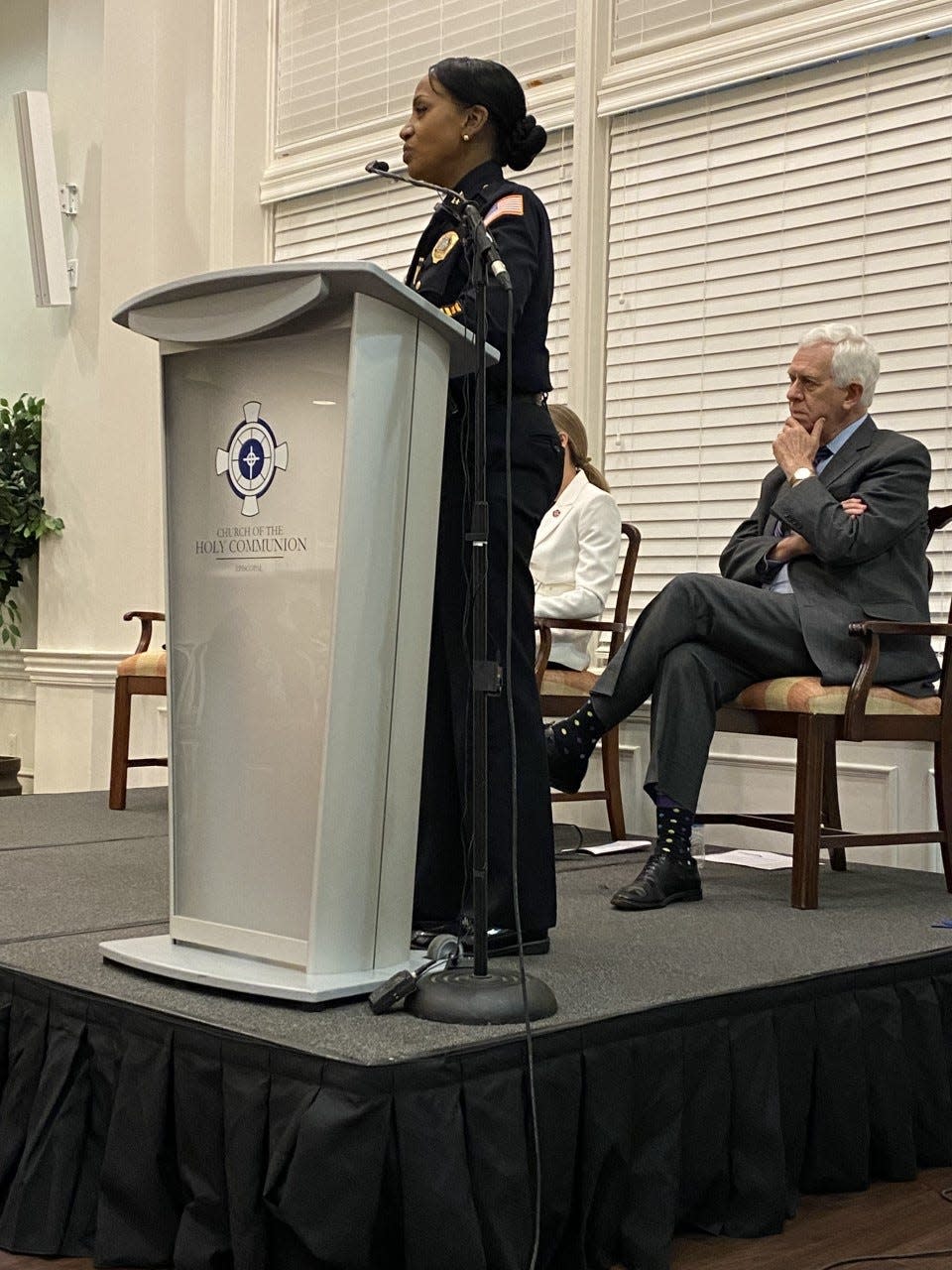Memphis police chief among officials to address elevated crime in Memphis, possible solutions

Police recruiting, crimes committed by minors, an elevated level of gun crime, and reckless driving were among the topics officials discussed in a community forum held in East Memphis Wednesday.
The head of Memphis police, Chief C.J. Davis, joined Shelby County Dist. Atty. Gen. Amy Weirich and Memphis Shelby County Crime Commission president Bill Gibbons to highlight what measures officials can, and cannot, take as an elevated crime level in city limits continues to hold steady.
Discussion points at the forum were underpinned by data from the crime commission, the nonprofit entity that tracks and publishes statistics culled from law enforcement agencies.
Davis, just six months into her appointment as Memphis' top cop, said part of her tenure at MPD so far has been about "taking a very, very close look" at what resources Memphis police have at their disposal.
Like her predecessor, former police director Mike Rallings and Memphis Mayor Jim Strickland, Davis identified police recruitment as a top priority. Her goal, she said, is to recruit 300 new officers over the next two years, which would push the compliment of police officers somewhere north of 2,200 — provided the typical rates of attrition within the force hold steady.
Police recruiting: Strickland again wants to let Memphis cops live outside the county. What has changed since 2020?
Davis said there's a balance to strive toward within the issue of police recruitment. Ideally, there are enough officers to effectively respond to calls, she said. But she also expressed a desire to prevent communities from feeling suffocated.
"We don't want to over-militarize," Davis said.
On the subject of reckless driving, a topic that spurred a flurry of head nods from the audience, Davis acknowledged Memphis drivers take dangerous driving to a new level.
A recent commitment from the Tennessee Highway Patrol means that 16 troopers will stay stationed on Memphis highways and I-40, areas that the state has jurisdiction over. And while Davis said the commitment is welcome news, she also noted that reckless driving marked by the sounds of racing, roaring engines and screeching donuts feels omnipresent in Memphis, particularly in the Downtown area.
She also said she's been instructing police officers to impound the cars of any drivers they witness driving dangerously. Davis has previously commented that the priorities of Memphis police have shifted from pulling drivers over for minor infractions like broken taillights.
But, she said, she has instructed officers to start impounding vehicles of drivers when those officers witness driving that endangers those around them.
On the subject of violent crime and weapons offenses, Davis has inherited a problem that Rallings decried for years; since the passage of a 2013 law that allows citizens to store firearms in their vehicles, the number of firearms stolen out of vehicles has risen yearly.
Youth violence: Read the letter SCS Superintendent sent to parents about the spike in youth gun violence
Opinion: Gun theft, MPD police retention and recruitment major factors in solving Memphis' violence
In September, the previous record of guns stolen from cars in Memphis — 1,324 for all of 2020 — has been surpassed. More than 1,381 guns have been taken from vehicles this year. The total comprises 67% of all guns seized by police in 2021.
Weirich, who followed Davis, kept a tight focus on the problem of keeping violent offenders incarcerated for full sentences.
Currently, she said, prosecutors and police are hampered by sentencing laws as written.
"All we want as prosecutors is a solution to not have violent offenders re-offend," Weirich said, explaining that violent offenders often serve a fraction of sentences issued by a judge.
Programs within the prosecutors office work in tandem with police to keep tabs on those that have multiple convictions for violent acts. But the laws as they stand now are somewhat toothless without a period of incarceration that matches the severity of the crime.
"There's this sense that it's some big joke and it's not very serious," Weirch said.
Weirich also touched on the practice of transferring juvenile offenders to criminal court, a practice that has drawn criticism from faith-based organizations like MICAH and activists.
For the majority of juvenile offenders, she said, offenses are tried in juvenile court. But so far in 2021, 25 juvenile offenders have been transferred to criminal court: Four offenders are facing murder charges, six are facing sexual assault charges, and others are accused of violent offenses like carjacking and aggravated robbery.
Micaela Watts is a reporter for The Commercial Appeal, and can be reached at micaela.watts@commercialappeal.com.
This article originally appeared on Memphis Commercial Appeal: Memphis, Shelby County officials address violent crime at forum 2021

